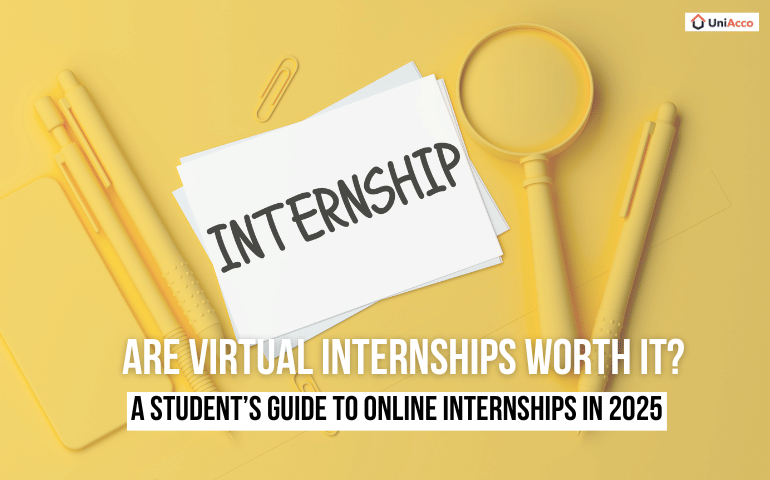Research about work is as important as researching your degree course and higher education. When it comes to being a student, you may be caught in a dilemma between work-study vs. internship vs. part-time Job while pursuing your education simultaneously.
It is important to note that a job has more to it than just offering you a pay-check. If you want an invaluable experience you must know what resonates with you best. For this purpose, you must first weigh the pros and cons of work-study vs. internship vs. part-time job and then decide for yourself.
This article will reveal to you the key differences between internships, work study & part time jobs and help you make the best choice for yourself.
Weighing The Pros and Cons of Work-Study vs. Internship vs. Part-Time Job
What Is Work-Study?
In very simple terms, work-study is an employment opportunity where you can work without discounting your academic experience. This may be in the form of co-operative education in Canada or the Federal work-study program in the USA. Students may choose to get hands-on experience by working simultaneously for a company or choose to work in between their semester breaks. Either way, work-study programs have gained momentum, especially in western countries.
Pros Of Work-Study
- One reason why students prefer opting for work-study programs is that usually, these programs are on-campus. This means that students save time and money on travelling and gain work experience without having to step out of their academic environment.
- The stipend that students receive as a part of the work-study program is usually enough to pay off their tuition fees.
- As a student who is also working under the work-study program, you are allowed to make mistakes. This is because the organization you are working for invariably will recognise you as a student who has just stepped into the work industry. As a result, you are allowed to learn by making mistakes.
- It is a win-win situation for the organisation as well as for the student. This is because students are able to pay off their tuition fees and organisations are able to get work done at a lower cost.

Cons of Work-Study
- The stipend may not be enough to cover your living expenses. Although you may be able to cover your tuition fees, the stipend gained through work-study programs is not enough to cover other expenses.
- Work-study placements are highly competitive because they are an ideal opportunity for students to not only complete their studies but also gain work experience at the same time. As a result, you will face a lot of competition as many students are fighting for the same position.
Confused between Work-Study vs. Internship vs. Part-Time Job? Read: Various alternatives to graduate schemes!
What Are Internships?
Internships are temporary work positions that allow students to expose themselves to a plethora of work-types. What this means is that internships cover multiple roles within an organisation and you may choose to take the responsibility of executing a role within that company. They are entry-level jobs that students usually take up, in order to brighten up their CVs by including unique work experiences. The major difference between work study vs paid internship is that work-study is usually a part of the academic curriculum whereas internships are independently acquired.
Pros of Internships
- It is the perfect thing to take up if you are not sure about what you want to do in life or are figuring out your career path.
- If you do well in your internship and are happy with your work, it is most likely that the company will absorb you and offer you a permanent position. This means you are investing your time and effort for a higher return.
- Internships are the most ideal way to expand your network and make a mark in your choice of industry.
- Internships are a brilliant way to fill gaps in your CV.
Cons of Internships
- Internships are more often than not unpaid. This is because internships offer the interns other perks such as remote working or need-based internships that do not require attendance every day. Sometimes companies who require interns to travel to the work destination pay their travel expenses as well.
- You may realise mid-way through that you do not like the subject/field you are interning in and want to change your career path.
What Are Part Time Jobs?
Part-Time jobs are also known as “working after hours”. As a student, your main responsibilities revolve around academics, assignments and university lectures. Part-time job roles are taken up by students who wish to work as well as study. Part time job roles may or may not be aligned with your career path and the reason for doing a part-time job differs from student to student. Some students wish to cover their living expenses and other ancillary costs and part time jobs allow them to do so. A part time-job may include anything: from managing a retail store or working part-time in your choice of industry (but the latter is possible only if you are extremely lucky!)
Pros Of Part-Time Job
- You will be exposed to the real world work environment. The role of a part-time employee does not differ much from that of a full-time employee. However, while a full-time employee dedicates all of their time to the job role, a part-time employee dedicates only a certain amount of time to the same work.
- If we compare work-study vs. internship vs. part-time job, a part-time job will offer you greater opportunities in terms of quality of work and first-hand experience.
- The earning potential in a part-time job is higher than work-study vs internships.
- If you are searching for part-time jobs, you will realise that there are unlimited opportunities to work as a part-time professional. This means that you can take up multiple roles as per your convenience and interest.
- Taking up a part-time job will be credited to your CV. Whenever you are applying for a full-time job position in the future, your part-time work experience will hold a lot of weight.
Cons Of a Part-Time Jobs
- There is no flexibility in terms of wages and working hours. If you have committed to spend a said number of hours to the job, you will not have the flexibility to change your shift. Even if you do, you may have to re-apply for the same job role.
- Part-time job employers usually do not cover the employee’s travel expenses as they do in work-study and internships.
Thank you for reading this blog on Pros and Cons Of Work-Study vs. Internship vs. Part-Time Job. If you are interested in reading more such articles related to student life, the following should be of interest to you:
- 12 Daily Habits That Will Make You Successful In Life
- Public or Private? Here Are The Top Universities In France!
- 7 Incredibly Unique Things To Do In France
- How to Get Internship in UK for International Students















0 Comments